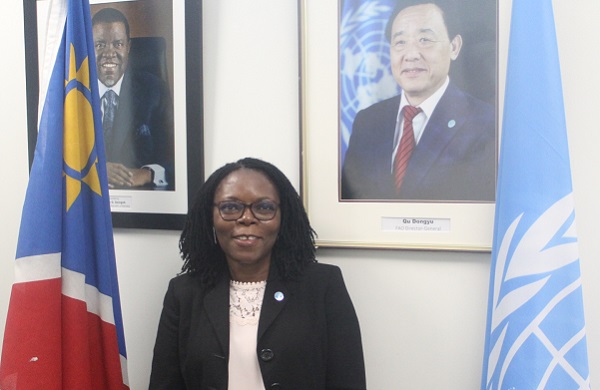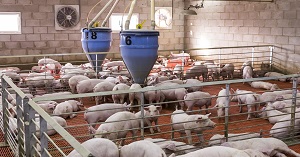
The FAO at a glance – Namibia Country Representative provides overview of activities and goals

As the year rounds off, the Food and Agriculture Organization of The United Nations (FAO) Representative in Namibia, Ms Farayi Zimudzi recently took time to unpack what the agency has been doing in the country in a Q&A session
What is the overall objective of FAO internationally and what does the agency stand for?
The Food and Agriculture Organization of The United Nations (FAO) is a specialised agency of the UN focusing on technical support in the agriculture and natural resources sector. FAO was founded on 16 October 1945, with the most important objective to help eliminate hunger, food insecurity and malnutrition. This is achieved through making agriculture, forestry and fisheries more productive and sustainable and in efforts to reduce rural poverty. Currently, the Organization has over 194 member states, with 54 of these being in Africa. The FAO country Representation offices work to assist governments in developing policies, programmes and projects to address the root causes of hunger and malnutrition; help them develop their agricultural, fisheries and forestry sectors, and also use their environmental and natural resources in a sustainable way.
What is the agency focusing on in Namibia?
In Namibia, the FAO Representation is the lead agency for agriculture, forestry, fisheries and rural development and supports the government in the development of programmes that will lead to a sustainable food achievement and the eradication of poverty. This is done through the implementation of the Country Programming Framework (CPF). The current CPF runs from 2019 to 2023 and sets out four priority areas to guide FAO partnership with the Government. The CPF was developed in consultation and agreement with various stakeholders, specifically large number of Government Ministries, Offices and Agencies, several non-state actors, civil society stakeholders and the UN Country Team. The four priority areas identified are:
• Priority 1: Strengthened policy, legal, strategic and institutional frameworks for agriculture, fisheries, forestry, food security and nutrition
• Priority 2: Improved agricultural production, productivity, food safety and strengthened value chains
• Priority 3: Strengthened capacity for land governance and natural resources management
• Priority 4: Strengthened capacity for disaster risk reduction, resilience building and climate change adaptation and mitigation
Food security is central to FAO’s mandate, in light of the subsequent droughts in Namibia how was FAO involved in maintaining this mandate?
Yes, food security is at the core of the Organization’s mandate, specifically in terms of eliminating hunger and malnutrition. This is done in line with the CPF and in partnership with line ministries.
In addition to providing support to respond to the immediate needs of drought affected small scale farming households, FAO also recognizes the importance of strengthening the resilience not just of the farmers but also of the systems – both natural and institutional. On this front, a number of recent and ongoing interventions are worth mentioning.
Recently, with funding from the European Union, FAO supported the Ministry of Agriculture Water and Forestry to promote Conservation Agriculture (CA) mainly through training farmers and staff in the Ministry. The approach leads to greater crop yields and also optimizes soil moisture and nutrients. By so doing, the soil is not only conserved, but also used sustainably and yields are improved even when inadequate rain has been received. This approach therefore leads to sustainable land management, environmental protection & climate change adaption mitigation.
Currently, FAO is supporting the Ministry of Agriculture, Water and Forestry (MAWF) and other sector stakeholders to develop a Disaster Risk Management (DRM) strategy for the agricultural sector. The strategy aims to enable relevant institutions to be better prepared for, respond to and recover from disasters that impact the sector. These disasters could be drought, floods, veld and bush fires, plant and animal pests and diseases.
A couple of resilience building programmes are under development within the framework of the CPF focusing on sustainable forest and veld management.In addition, FAO is also supporting the development of a National Agricultural Investment Plan (NAIP) which is also termed as the Agri-Food Business Sector Strategy which aims to develop a private and public partnership aimed at boosting the performance of the sector.
What emergency programmes and rehabilitation was FAO engaged in light of the drought?
FAO has availed 180 tonnes of multi-nutrient blocks and 180 tonnes of nutritious hay, to benefit 1,200 vulnerable farmers and households in Erongo, Kunene, Otjozondjupa and Omaheke Regions. This assistance is contributing to saving the few remaining livestock which are mainly core breeding herd. Most importantly, lessening the burden of those farmers who are unable to access nutritious feeds/fodder, for their livestock.
Furthermore, through providing training on Livestock Emergency Guidelines and Standards (LEGS) FAO boosted the capacity of 42 agricultural extension officers from all 14 Regions to better manage and protect the livestock assets and livelihoods of agro-pastoralists affected by drought. The agricultural extension officers were trained on the principles, knowledge and skills of emergency preparedness, response and recovery to humanitarian crises and animal health emergencies. This priority area is to strengthen capacity for disaster risk reduction, resilience building and climate change adaptation.
With funding from the Republic of Korea, FAO is supporting the rehabilitation of 4 wells in Omusati and 4 boreholes each in Erongo and Kunene to ensure that households can access water for their animals.
Any other information that you would like to share with us concerning FAO?
As a specialised technical agency of the United Nations, FAO leverages its technical expertise in the agriculture and related sectors, and through partnerships with a broad range of stakeholders to support countries achieve their developmental goals. FAO is thus committed to supporting the nation achieve Zero Hunger.













































